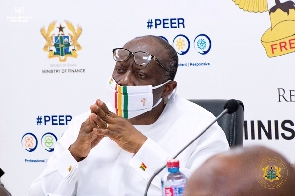 Finance Minister, Ken Ofori-Atta
Finance Minister, Ken Ofori-Atta
This week government is pursuing a significantly reduced target of GH¢783 million through cedi denominated domestic debt securities.
This is down from its target of GH¢1,043 million from treasury bill issuances last week and GH¢836.06 million a fortnight ago.
However, there is the possibility that if investors bid for a higher amount than the target, within bid ranges that are acceptable to it, government could opt to take part or all of the extra amount as well.
Instructively, last week, government accepted all of the bids for 91-day, 182 day and 364-day treasury bills, totalling GH¢1,155.92 million, despite its targeted amount being lower at GH¢1,043 million. It also raised a further GH¢768.08 million through the rollover of maturing two-year notes.
In the previous week it also accepted the entire amount of GH¢836.06 bid for through 91, 182- and 364-day treasury bills.
This week government will only issue 91 and 182 day treasury bills, the two instruments with the shortest tenors in its cedi denominated domestic debt issuance portfolio.
Government is being forced to accept bids beyond the targets established in its quarterly debt issuance calendar because of the financial pressures it is facing due to its inordinate fiscal deficit for 2020.
The fiscal deficit is targeted at 11.4 percent which is more than twice the 4.7 percent deficit originally envisaged in the 2020 budget before the COVID-19 pandemic erupted, reducing its revenues below target and raising its expenditures above target.
This forced major revisions of the budgetary targets at the midyear budget review done in July.
While government is more or less on target to stay within the revised fiscal deficit target for this year, some analysts argue that the target is understated since it excludes the cost of servicing the debt incurred to finance the financial sector reforms which now stands at close to GH¢20 billion.
Government has controversially opted not to include spending on the reforms as part of its regular expenditure on the grounds that it is a one-off expenditure item, although the International Monetary Fund (IMF) has sided with the political opposition and several non-partisan public finance commentators to call for its inclusion in fiscal deficit computations.
Government has resisted such calls but now faces the problem of financing that aspect of its deficit which is not included in its public deficit figures. Instructively however it is included in the public debt.
Public finance commentators suspect this accounts for government taking more from the domestic debt market than its debt issuance calendar targets, whenever the chance arises.
- Commonwealth countries must create 5,000 jobs everyday till 2030 - Foreign Affairs Minister
- Use COVID-19 fund to strengthen health care, immunization financing — HFFG
- Parliament records a new case of coronavirus
- Breach of coronavirus safety protocols: GMA calls for action
- Chadians line up for Sinopharm as coronavirus vaccination campaign begins
- Read all related articles












